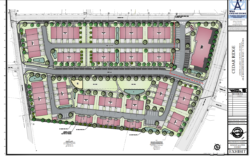Athens should lift zoning restrictions on development to allow more homes to be built, affordable housing experts said at Envision Athens’ fourth annual Fair and Affordable Housing Summit.
Representatives from the Athens-Clarke County government, nonprofit service providers and a local bank came together at First United Methodist Church Apr. 29 to discuss the state of housing in Athens and to find ways to improve affordability. The event was mostly attended by employees of the represented organizations and similar nonprofits. Speakers highlighted their organizations’ work and the contributions they’ve made to affordable housing in Athens. They also discussed the challenges their clients face while searching for an affordable place to live.
Sheila Crisp, executive director of the Athens Housing Authority, described the thousands of beds her organization rents for only 30% of residents’ incomes, down to a minimum of $50 a month for those with no income at all. While this is a valuable service for those who cannot afford market rental rates, Crisp explained that the waiting list for these units can be up to two years long.
Jenna Moon, the director of care coordination for the Athens Community Council on Aging, told the audience that other waiting lists for subsidized housing in town are also at least a year, if not three or four years long. While the lists have been long for some time, the sharp rent increases in Athens over the past five to seven years have made them even longer.
“We receive calls every day from people who are needing to vacate their rental home. Many of these people have rented their home for years, even decades, but their rents are being increased by an amount they simply cannot afford,” Moon said. “Athens has long been heralded as one of the best places to retire. Due to our lack of appropriate and affordable housing, I don’t know if we can any longer hold that title.”
The Athens Housing Authority’s current public housing inventory only addresses a fraction of the need, which is why one of the organization’s main priorities is to add units to its housing stock. The authority recently celebrated the grand opening of phase one of the redevelopment of Bethel Midtown Village, now known as The View at NoDA, and is planning to build more units there in additional phases. Funding for these projects comes primarily from low-income housing tax credits, which are a limited resource provided by the federal government and only made available once a year.
One solution for the problem of affordable housing could be a large increase in federal funding for cities like Athens. Yet, given the current political climate, this seems unlikely to happen anytime soon. Assuming that greatly expanding Athens’ stock of subsidized housing is out of reach, the only other option may be to slash government restrictions in order to free the private sector to solve this problem for us.
Charles Smith, vice president of operations at Athens Area Habitat for Humanity, gave a long list of regulations he would like to see cut in order to increase housing supply and reduce costs for developers. For example, he called for the ACC government to reduce the minimum allowed house size, to allow duplexes, quadruplexes, townhomes and cottage courts in single-family neighborhoods, and to allow homeowners to build accessory dwelling units (also known as “in-law suites”). He also called for removing parking requirements, setback requirements, height restrictions and for an increase in allowable density in residential zones.
“Essentially, the government should remove barriers to construction that have no effect on life, health or safety,” Smith said.
Many of these changes have also been suggested in various governmental studies and reports, such as the 2022 study on “missing middle” housing. Yet, the ACC Commission has repeatedly failed to enact them. For example, the commission rejected a proposal to allow accessory dwelling units in 2022 in a 5-4 vote.
Single-family homeowners typically oppose new construction nearby, just like they oppose measures that would allow for density increases in their neighborhoods. ACC Commissioners and other government officials are often very responsive to these homeowners as they are the people who form their social, electoral and financial base of support. That means the opposition that many homeowners have to policies that would increase housing affordability weighs heavily on local decision makers, while the opinions of policy experts are more easily ignored.
Towards the end of the meeting, John Morris, the THRIVE Community Programs Team Lead for Advantage Behavioral Health, spoke up, wondering when the Athens community would start to take its housing problem seriously.
“Everytime we have new housing developments come forward, we have tons and tons of people who live in the neighborhood who are not happy to see new housing developments or increased density,” Morris lamented. “At what point do we as a community accept that we don’t have enough housing and become willing to make the legislative decisions it takes to bring in more density?”
Commissioner Ovita Thornton, who was present at the meeting and who gave the closing address, responded to Morris’ question in her remarks, indicating a willingness to change her policy positions.
“We do need to make some changes. The zoning issues are a problem. I didn’t realize it was a problem until I started talking to all of you. I was not a fan of [accessory dwelling units] earlier. I’m a fan now, if you do it right,” Thornton said.
Other speakers at the summit included Marqueta Swain, affordable housing administrator for the ACC Housing and Community Development Department, and Rhodes McLanahan, CEO of First American Bank.
Like what you just read? Support Flagpole by making a donation today. Every dollar you give helps fund our ongoing mission to provide Athens with quality, independent journalism.










